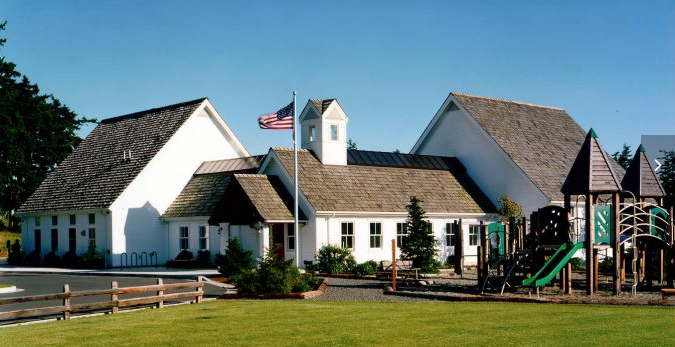— by Matthew Gilbert, Orcas Issues reporter —
The second meeting of Orcas Island’s new Health Care District commission took place May 15 at the Eastsound Fire Hall, and the process continues to be a case study in how to build something from nothing – in this case the legal, financial, and administrative backbone of the island’s healthcare future. Continuing the food analogy from an earlier Orcas Issues article, it’s not just learning about how sausage is made, but how the factory that makes the sausage is built, equipped, and managed. As commission chair Richard Fralick noted at the outset, “We’re still in limbo here. We don’t even have by-laws. It’s kind of loosey goosey.”
That said, the commissioners continue to bring considerable commitment and accountability to a process that needs considerable patience and investigation under the pressure of a ticking clock.
The bulk of the meeting was spent on reports from two of the four sub-committees formed at last week’s meeting: Finance (with commission members Fralick and Patty Miller) and Legal (Pegi Groundwater and Art Lange). Most of their work in these areas has been information-gathering.
The immediate challenge of Finance is securing short-term sources of funding. “We need operating capital now and to fund ourselves until April 2019,” stated Fralick. Primary options include the County and two banks, Islanders and Washington Federal. Specific options include a loan, a line of credit, and a bond. “There are a lot of moving parts” to each option, explained Miller, “but there’s a great deal of interest.” An amount up to $1M is being discussed.
According to Fralick, “The County looks the most attractive right now because of their better rates and no loan fees.” The catch, said Miller, is that such a loan must be approved by the County’s finance committee and they only meet quarterly. To add to the complexity, that committee’s next meeting was in two days. Miller moved for the commission to approve a preliminary ask to bring to that meeting and “get our needs on the County’s radar,” final details to be worked out later. It was quickly approved.
Yet another potential hurdle: The County requires the passage of a resolution regarding a millage rate. “It’s too soon for that,” said Miller, “though maybe we could propose a two-stage process.” Lange suggested that the resolution make clear that it’s being done to comply with County requirements.
In the meantime, Fralick and Miller are in contact with representatives from the Orcas Library as well as the Lopez and San Juan PHDs to look at their budgets and learn how they used bridge-funding to close gaps and finance preliminary operations. Miller hoped that by next week the committee could bring some basic funding and borrowing models to the commission for comparison and discussion.
When it came to choosing a physical address to meet business license requirements, the commissioners were temporarily stumped. It came down to the Fire Hall, where they are committed to meeting through the summer, or the UW Medical Center, which may have available office space. “If we can save money working through the Medical Center, great,” said Lange, “but I’d prefer to avoid any direct relationship with them at this point.”
Next up was the Legal team, whose primary mission was to find a bond attorney and one to help navigate the process of establishing the PHD. The key issues are contracts, compliance issues, liability issues, and insurance. “We identified five potential candidates and have narrowed it down to two,” reported Lange. “Brad Burg with Foster Pepper [which handled the Lopez and San Juan PHDs] and Don Black with Ogden Murphy Wallace.” Both are located in Seattle. “The next step,” added Groundwater, “is a more in-depth interview.”
Fralick suggested talking to a law firm in Spokane that handles “rural health clinic” designations, which may be more appropriate to the island’s needs.
Other legal considerations include by-laws, ethics policies, the handling of minutes, and even guidance on the difference between “motions” and “resolutions,” among a range of other considerations.
On the Staffing side, commission-subcommittee member Diane Boteler couldn’t make the meeting but fellow subcommittee member Groundwater reported that they are still having conversations on optimal organizational structures. “The search for a superintendent also continues,” she said. An immediate need: a minutes-taker. “So Patty can be unburdened,” said Fralick. “And we’ll need to pay them!”
The Technical subcommittee (Miller and Boteler) happily reported that a website url had been established (www.orcashealth.org) and email addresses set:
- dianeb@orcashealth.org
- richardf@orcashealth.org
- pegig@orcashealth.org
- artl@orcashealth.org
- pattym@orcashealth.org
“We’re still discussing what to include on the website,” said Miller. “We’re also looking for a volunteer webmaster.”
Miller then proposed that a Communications subcommittee be established “with members of the public.” The motion was approved and Art Lange will represent the commission on it. The topic will be on next week’s agenda.
It was noted that a $300k community development grant funded by rural tax revenue has gone out to bid. “Let’s find out if we qualify,” suggested Fralick. “How much could we get and what could we use it for?”
It’s easy to see how the ultimate purpose of a hospital district – a community’s health – could get lost in the weeds of all these head-pounding details. Fortunately, Lange closed the meeting by asking the big question: “What kind of primary care and services do we ultimately want? An economically driven model like UW’s or a more holistic approach? What we choose will impact everything.”
The answers to those questions – and the community’s role in such a decision – loom large on the commission’s priority list.
The next meeting of the Orcas Island Health Care District will be Tuesday, May 22 at the Eastsound Fire Hall from 4 to 6 p.m.
**If you are reading theOrcasonian for free, thank your fellow islanders. If you would like to support theOrcasonian CLICK HERE to set your modestly-priced, voluntary subscription. Otherwise, no worries; we’re happy to share with you.**








I was able to attend this meeting and this reporting is excellent. The Board has a lot of work to do and it is important for members of the public to attend some meetings and be informed.
Why does the Commission need $1 million in funding now? Has the Commission obtained and analyzed financials from UW and Dr. Shinstrom and already decided to fund the UW clinic and/or Dr. Shinstrom?
The money is needed to fund the clinic and Dr Shinstrom and hiring a manager. Tax District funding will not be available until April 2019.
Thank you, Mr. Gilbert for reporting on the PHD Commissioners meeting. It is essential that the community stays informed and engaged even when we cannot attend the meetings. Thank you for your journalism. It really matters!